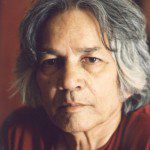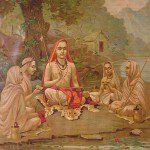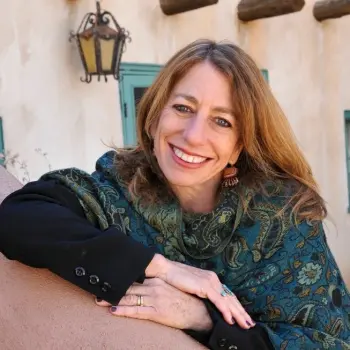Why do you need a guru? If you fall down, then pick yourself up and continue to walk. ~Krishnamurti
I’ve been reading with interest some of the posts of my fellow Patheos blogger Ambaa, also known as the White Hindu, who does a wonderful job of opening a window into Hindu traditions and philosophy. She also writes a regular series titled “Find a Guru” where she introduces us to individual gurus, warts and all.
Like a warning label that appears on any product with the potential to cause harm, Ambaa instructs readers to “exercise caution when selecting a teacher”. And I believe she does this for good reason. Time and time again, we read reports of gurus behaving badly (not that the Eastern philosophies have a monopoly on bad behavior).
One recent case of a guru-gone-bad revolves around the renowned Zen Buddhist teacher Joshu Sasaki. Earlier this year, dozens of sexual harassment accusations against Sasaki came to light. It appears that over several decades the now 105-year old Sasaki misused his Zen teachings as a justification to sexually exploit his female students. It had me wondering:
Do you really need a guru to achieve spiritual enlightenment?
Now, I’m in full agreement that certain gurus have the potential to pass along vital, life-changing wisdom and I hear the argument that “real spiritual knowledge is not book learned”. In fact, you may have a guru in your own life who is now leading you down the path of enlightenment. But my personal belief is that while a guru can point you in the right spiritual direction, you’ve got to walk that path alone.
Personally, I have a favorite guru by the name of Yogani. He wrote the best book on meditation I have ever read, yet you’ve probably never heard of him—and for good reason. Yogani chooses to live anonymously, openly shunning his guru status. He publishes his teachings online for free. And while he believes gurus and teachers can sometimes be helpful, his frequent refrain is “the guru is in you.” In his words:
Your enlightenment depends on you more than anyone, because it is only through your desire and action that divine experience can rise in you. It is only through your nervous system that pure bliss consciousness and divine ecstasy can be known. You cannot delegate it. It is only by you making a daily effort to purify your nervous system that anything can happen. It is you who are making the journey.
I’m reminded of the author and spiritual teacher Andrew Harvey. For ten years, Harvey was a disciple of a Hindu guru named Mother Meera, helping her gain a worldwide audience through his book “Hidden Journey: A Spiritual Awakening”. He also co-wrote the worldwide bestseller The Tibetan Book of Living and Dying for the Tibetan mystic Sogyal Rinpoche.
But Harvey’s spiritual life went up in flames during a two-month period in 1994. First, Mother Meera insisted he split from his long-time male partner and marry a woman, causing Harvey to realize his guru “was not the divine master I had believed her to be”. Then, a few weeks later, it was revealed in the press that 11 of Sogyal Rinpoche’s female students were suing him for sexual abuse.
Harvey was devastated that the two people he had helped put on the spiritual map had acted contrary to their own teachings, but in time he found an alternate path. After months of meditation and prayer, he had a moment of revelation where he discovered “the force, passion, and transforming power of the path of direct communication with God”. Harvey came to the conclusion that:
Christ’s real teaching was not, as the churches have claimed, about worshiping him as son of God; it was an attempt to transmit to everyone else the intimate, direct, totally transforming relationship he had himself realized with God…after all, if everyone is able to be in unmediated contact with the Divine, to be taught in the terms of their own lives directly by the Divine, then what need is there for a priest class, monasteries and temples, or gurus?
If you buy into that belief—that what we ultimately seek to achieve on the spiritual path is a direct, one-on-one connection with the divine, do we really need a spiritual guide or master to show us what is already within us? After all, while a guru can show you the way, ultimately this connection with the divine can not be made by another person for you—it must be made by you.
I’ve written previously about the Gnostic texts, many of which point to an inner path of enlightenment. And while much of this “find God within” thinking never made it to the four narrowly scripted gospels of the Bible, there are some passages that convey that very message. Take this one found in Luke 17:20 and 17:21:
One day the Pharisees asked Jesus, “When will the Kingdom of God come?” Jesus replied, “The Kingdom of God can’t be detected by visible signs, nor will people say, ‘Here it is,’ or ‘There it is,’ because the kingdom of God is within you.”
The message: don’t go looking over here or over there or even to Jesus to find God, for you can find the divine inside you. It truly is a radical message, for it cuts out the need for a middle-man, be it a priest, a guru or any holy man, to access God.

This “do-it-yourself” sentiment is echoed by the great Indian religious teacher Jiddu Krishnamurti. A deep thinker and a major influence on Aldous Huxley, Krishnamurti found gurus “unnecessary” and renounced the guru role even though many tried to thrust it on him. He wrote:
The pursuit, all the world over, of gurus and their systems…seems to me so utterly empty, so utterly futile, for you may wander all over the earth but you have to come back to yourself. And most of us are totally unaware of ourselves…the more you know yourself, the more clarity there is.
He also gave the advice below to those who choose to follow gurus, a message also aimed at the devotees who sought to follow him:
The man who worships another because that other has realized is really worshiping authority and therefore he can never find the truth.
As a practitioner of self-serve enlightenment, I’m well aware that this particular spiritual path is a bumpy one. As the wise man Krishnamurti himself said: “it sounds so easy, but it is extremely difficult.” It requires a limitless and on-going commitment to education and dialogue and prayer and contemplation, and this path has more than its share of ebbs and flows.
But during those glorious moments when it all falls into place, when the ego disappears and you feel a genuine sense of contentment—when the bliss wells up inside you to the point you can feel the living presence of the divine within—you realize that all the effort is worth it. You have encountered the essence of God, not through the eyes of another, but through your very own senses.













